I
GLOOM!
An October like November;
August a hundred thousand hours,
And all September,
A hundred thousand, dragging sunlit days,
And half October like a thousand years . . .
And doom!
That then was Antwerp. . .
In the name of god,
How could they do it?
Those souls that usually dived
Into the dirty caverns of mines;
Who usually hived
In whitened hovels; under ragged poplars;
Who dragged muddy shovels, over the grassy mud,
Lumbering to work over the greasy sods. . .
Those men there, with the appearance of clods
Were the bravest men that a usually listless priest of God
Ever shrived. . .
And it is not for us to make them an anthem.
If we found words there would come no wind that would fan them
To a tune that the trumpets might blow it,
Shrill through the heaven that's ours or yet Allah's,
Or the wide halls of any Valhallas.
We can make no such anthem. So that all that is ours
For inditing in sonnets, pantoums, elegiacs, or lays
Is this:
“In the name of God, how could they do it?”
II
For there is no new thing under the sun,
Only this uncomely man with a smoking gun
In the gloom. . .
What the devil will he gain by it?
Digging a hole in the mud and standing all day in the rain by it
Waiting his doom;
The sharp blow, the swift outpouring of the blood,
Till the trench of gray mud
Is turned to a brown purple drain by it.
Well, there have been scars
Won in many wars . . .
Punic,
Lacedæmonian, wars of Napoleon, wars for faith, wars for honour,for love, for possession,
But this Belgian man in his ugly tunic,
His ugly round cap, shooting on, in a sort of obsession,
Overspreading his miserable land,
Standing with his wet gun in his hand . . .
Doom!
He finds that in a sudden scrimmage,
And lies, an unsightly lump on the sodden grass . . .
An image that shall take long to pass!
III
For the white-limbed heroes of Hellas ride by upon their horses
Forever through our brains.
The heroes of Cressy ride by upon their stallions;
And battalions and battalions and battalions—
The Old Guard, the Young Guard, the men of Minden and ofWaterloo,
Pass, for ever staunch,
Stand, for ever true;
And the small man with the large paunch,
And the gray coat, and the large hat, and the hands behind theback,
Watches them pass
In our minds for ever . . .
But that clutter of sodden corses
On the sodden Belgian grass—
That is a strange new beauty.
IV
With no especial legends of marchings or triumphs or duty,
Assuredly that is the way of it,
The way of beauty . . .
And that is the highest word you can find to say of it.
For you cannot praise it with words
Compounded of lyres and swords,
But the thought of the gloom and the rain
And the ugly coated figure, standing beside a drain,
Shall eat itself into your brain:
And you will say of all heroes, “They fought like the Belgians!”
And you will say:“He wrought like a Belgian his fate out ofgloom.”
And you will say:“He bought like a Belgian his doom.”
And that shall be an honourable name;
“Belgian” shall be an honourable word;
As honourable as the fame of the sword,
As honourable as the mention of the many-chorded lyre,
And his old coat shall seem as beautiful as the fabrics woven inTyre.
V
And what in the world did they bear it for?
I don't know.
And what in the world did they dare it for?
Perhaps that is not for the likes of me to understand.
They could very well have watched a hundred legions go
Over their fields and between their cities
Down into more southerly regions.
They could very well have let the legions pass through their woods,
And have kept their lives and their wives and their children and cattle and goods.
I don't understand.
Was it just love of their land?
Oh, poor dears!
Can any man so love his land?
Give them a thousand thousand pities
And rivers and rivers of tears
To wash off the blood from the cities of Flanders.
VI
This is Charing Cross;
It is midnight;
There is a great crowd
And no light.
A great crowd, all black that hardly whispers aloud.
Surely, that is a dead woman—a dead mother!
She has a dead face;
She is dressed all in black;
She wanders to the bookstall and back,
At the back of the crowd;
And back again and again back,
She sways and wanders.
This is Charing Cross;
It is one o'clock.
There is still a great cloud, and very little light;
Immense shafts of shadows over the black crowd
That hardly whispers aloud. . .
And now! . . That is another dead mother,
And there is another and another and another. . .
And little children, all in black,
All with dead faces, waiting in all the waiting-places,
Wandering from the doors of the waiting-room
In the dim gloom.
These are the women of Flanders.
They await the lost.
They await the lost that shall never leave the dock;
They await the lost that shall never again come by the train
To the embraces of all these women with dead faces;
They await the lost who lie dead in trench and barrier and foss,
This is Charing Cross; it is past one of the clock;
There is very little light.
There is so much pain.
L’Envoi
And it was for this that they endured this gloom;
This October like November,
That August like a hundred thousand hours,
And that September,
A hundred thousand dragging sunlit days,
And half October like a thousand years. . .
Oh, poor dears!
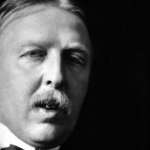








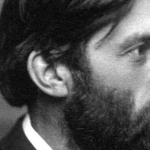
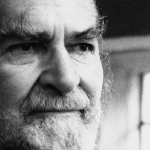
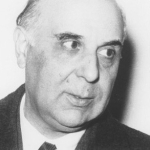




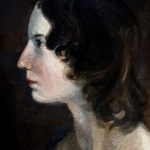
Comment form: